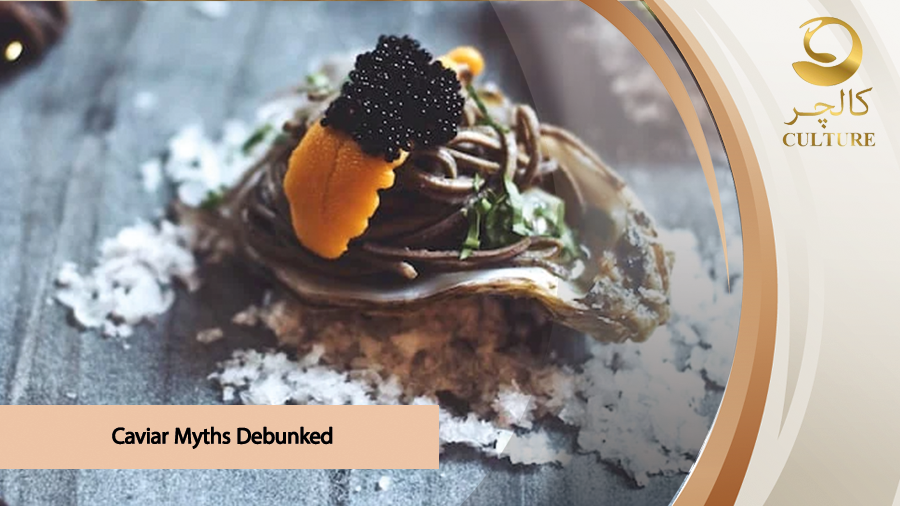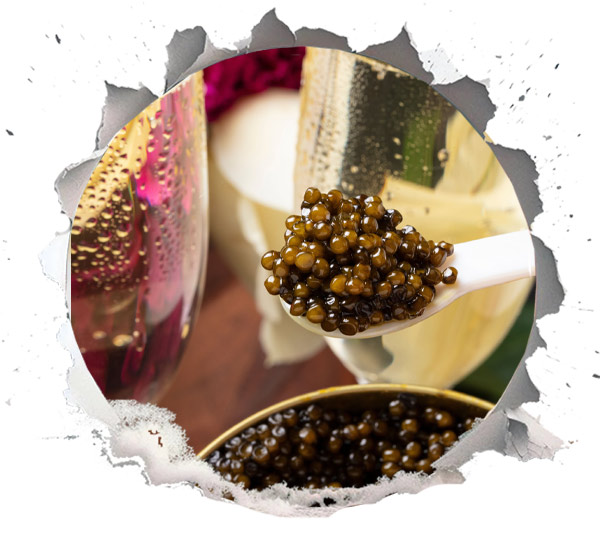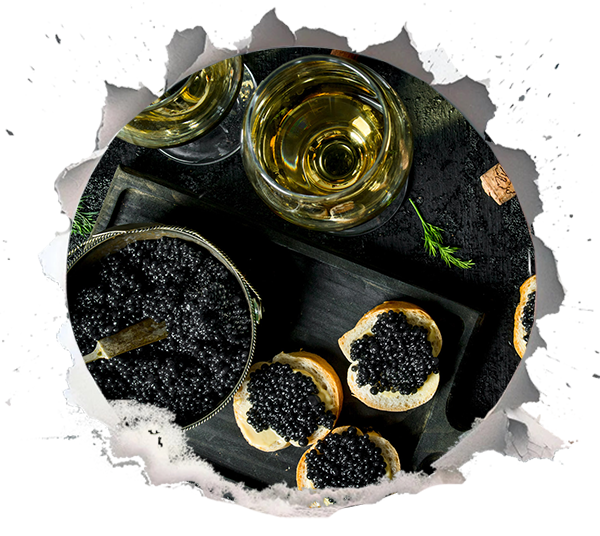Caviar Myths Debunked: What You Didn’t Know About Caviar

Caviar has long been synonymous with luxury, indulgence, and sophistication. Often associated with opulent dinners and elite gatherings, this delicacy has a reputation that precedes it. But how much of what we think we know about caviar is actually true? From its affordability to its shelf life and health benefits, there are countless myths surrounding caviar. Let’s dive into the world of caviar and debunk some of the most common misconceptions.
Basic Information About Caviar
First things first! Let’s take a closer look at this luxurious delicacy before we debunk the myths surrounding caviar. Understanding how caviar is made is the first thing you should know. The process begins with the careful rearing of sturgeon in aquaculture farms, where they are nurtured for several years until they reach maturity. Once the sturgeon is ready, the roe (eggs) are gently extracted, cleaned, and salted to enhance their flavour and preserve their quality. The roe is then graded based on size, colour, and texture before being packaged in airtight tins. This meticulous process ensures that every tin of caviar delivers a premium experience.
Myth 1: Caviar is Unaffordable for the Average Person
One of the most pervasive caviar myths is that it’s exclusively for the wealthy. While it’s true that caviar can be expensive, it’s not entirely out of reach for the average person. The price of caviar varies significantly depending on the type, quality, and origin.
For example, Almas caviar, sourced from the rare Albino Beluga sturgeon, is often considered the most expensive caviar, with prices reaching upwards of £5,000 per kilogram. However, there are more affordable options like Siberian or Ossetra caviar, which offer a similar taste experience at a fraction of the cost. Additionally, many suppliers like Culture Caviar now offer smaller tins (10-30 grams) that allow you to enjoy caviar without breaking the bank.
According to a 2022 report by Grand View Research, the global caviar market is expected to grow at a compound annual growth rate (CAGR) of 8.5% from 2023 to 2030, partly due to increased accessibility and a wider range of price points. So, while caviar remains a luxury item, it’s no longer reserved solely for the elite.
Myth 2: All Caviar Tastes the Same

Another common misconception is that all caviar tastes identical. In reality, caviar’s flavour profile can vary dramatically depending on the species of sturgeon, its diet, and the region it’s sourced from.
- Beluga caviar is known for its buttery, creamy texture and subtle nutty flavour.
- Ossetra caviar offers a richer, more complex taste with hints of seaweed and brine.
- Sevruga caviar is bolder and saltier, making it a favourite for those who prefer intense flavours.
Even within the same species, factors like water temperature and harvesting techniques can influence the taste. This diversity means there’s a caviar variety to suit every palate, from the novice to the connoisseur.
Myth 3: Caviar Has a Short Shelf Life
Many people believe caviar must be consumed immediately after purchase, but this is far from the truth. While it’s true that caviar is perishable, modern packaging and storage techniques have significantly extended its shelf life.
High-quality caviar, when stored properly in a refrigerator at -2°C to 4°C, can last up to four weeks unopened. Once opened, it should be consumed within 2-3 days to maintain its freshness and flavour. Vacuum-sealed tins and pasteurisation have also played a role in preserving caviar’s quality for longer periods.
Pro tip: Always use a non-metallic spoon when serving caviar, as metal can alter its taste.
Myth 4: Caviar is Just a Fancy Topping
While caviar is often used as a garnish, reducing it to just a “fancy topping” undermines its culinary versatility. Caviar can be the star of a dish, adding depth and complexity to a variety of recipes.
For instance:
- Pair it with blinis and crème fraîche for a classic canapé.
- Use it to elevate scrambled eggs or sushi rolls.
- Incorporate it into pasta dishes or risottos for a luxurious twist.
Chefs around the world are experimenting with caviar in innovative ways, proving that it’s much more than just a decorative element.
Myth 5: Caviar is Unhealthy
Some people assume that caviar is unhealthy due to its high salt content. However, when consumed in moderation, caviar is actually a nutrient-dense food with numerous health benefits.
Caviar is packed with:
- Omega-3 fatty acids, which support heart health and reduce inflammation.
- Vitamins A, D, and B12, essential for immune function, bone health, and energy production.
- Protein and amino acids, which aid in muscle repair and growth.
A study published in the Journal of Food Science and Technology highlighted that caviar contains antioxidants that can help combat oxidative stress. Of course, like any indulgent food, it’s best enjoyed in moderation.
Myth 6: Caviar is Only for Special Occasions
While caviar is often associated with celebrations, there’s no rule saying you can’t enjoy it on a regular Tuesday night. In fact, incorporating caviar into your diet more frequently can help you appreciate its nuances and develop a deeper understanding of its flavours.

Many caviar enthusiasts enjoy it as part of a weekly treat, pairing it with simple dishes to create a sense of everyday luxury. After all, life’s too short to save the good stuff for special occasions!
Myth 7: All Caviar Comes from Wild Sturgeon
The idea that all caviar is sourced from wild sturgeon is outdated. Overfishing and habitat destruction have led to a decline in wild sturgeon populations, prompting the rise of sustainable caviar farming.
Today, over 90% of the world’s caviar comes from aquaculture farms, where sturgeon are raised in controlled environments. These farms adhere to strict ethical and environmental standards, ensuring the long-term survival of sturgeon species while producing high-quality caviar.
By choosing farmed caviar, you’re not only enjoying a premium product but also supporting sustainable practices that protect our oceans.
Myth 8: Caviar is Overrated
Finally, some sceptics argue that caviar is overrated and not worth the hype. While taste is, of course, subjective, caviar’s enduring popularity speaks volumes about its timeless appeal. That said, this is undoubtedly one of the most repeated caviar myths. Its unique texture, rich history, and cultural significance make it a culinary experience unlike any other. As the old adage goes, “You don’t know until you try it.” For many, that first taste of caviar is nothing short of a revelation, often turning curious newcomers into lifelong enthusiasts.
Why Choose Culture Caviar?
At Culture Caviar, we’re passionate about delivering caviar that combines exceptional quality with affordability. Our sustainably sourced products are carefully selected to ensure you enjoy the finest flavours while supporting ethical practices. Whether you’re a seasoned caviar lover or a curious newcomer, we invite you to explore our range and discover the true essence of this luxurious delicacy.
If you’re looking for the best price for Beluga caviar, it’s essential to shop around and compare suppliers. While Beluga caviar is known for its premium price tag, many reputable sellers offer competitive rates without compromising on quality. At Culture Caviar, we pride ourselves on providing exceptional Beluga caviar at accessible prices, allowing you to indulge in this luxurious treat without overspending.
Final Thoughts
Caviar is a fascinating food with a rich history and a wealth of misconceptions. By debunking these caviar myths, we hope to demystify this luxurious delicacy and make it more accessible to everyone. Whether you’re indulging in a special occasion or treating yourself to a midweek pick-me-up, caviar offers a unique experience that’s worth savouring.
So, the next time you hear someone say caviar is overpriced, overrated, or just for the elite, you’ll know the truth. Caviar is a versatile, nutritious, and surprisingly accessible food that deserves its place in the culinary spotlight. Ready to explore the world of caviar? Elevate your dining experience with our exquisite selection.


I think caviar means myth.
There are some debunking myths.😂😂